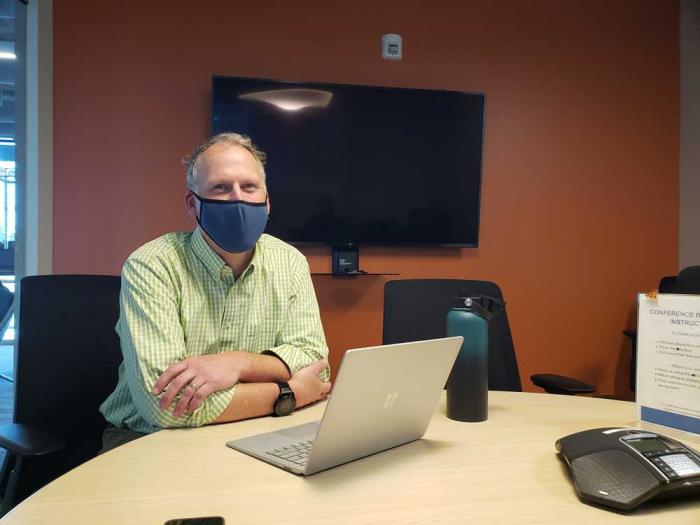Taking the intern-to-career track
Greg Fisher’s relationship with Denver Water, where he’s the manager of demand planning, started long before he began working at the utility.
“I grew up in the service area, so I’ve been drinking Denver water my entire life,” Fisher said.
Already familiar with the flavor and rhythms of water and usage in Denver, Fisher took a deep dive into the Denver Water system while interning in the utility’s survey group during summer breaks from college, then as a full-time employee of the survey group starting in 1997.
“I always say that survey is the best education you can have at Denver Water. I feel like I’ve seen our entire water system and understand it better because I’ve been there,” he said.
Fisher remembers working to stabilize the steep slopes in Waterton Canyon southwest of Denver, through which the South Platte River flows and a key part of Denver Water’s system, and getting caught in a swift summer thunderstorm.
And he remembers Jones Pass, a section of Denver Water’s 4,000-square-mile collection system that’s quiet in the summer and unreachable for much of the winter.
“Once you get through or over Jones Pass, it’s a different world — remote and isolated,” he said.
When a job in the utility’s rates division opened, and Fisher jumped at the chance to dive deeper into Denver Water’s systems, policies and planning — following what he calls his “true calling.”
“Rates is fun because it’s the culmination of so much of what we do — planning, building and operating facilities, meeting customers’ demands — all of it wrapped into this dollar sign that is what we need to charge our customers,” he said.
These are the people who answer your call to Denver Water.
“It’s like going deep into the weeds and seeing how things affect each other. And I stayed there — moving to manager of demand planning in 2005. I like connecting water and use back to the broad picture and Denver Water’s mission, along with our high-level strategies and planning,” he said.
As manager of demand planning, Fisher leads a group that analyzes how customers use water and how demographics and climate change might factor into water use.
“We look at our customers’ needs and work to understand them, not just what they need now but well into the future — so we here at Denver Water can understand how they’re changing and how we can meet their needs, implement our water efficiency programs and plan for the future,” he said.
Fisher said he’s learned to appreciate and value Denver Water’s customers over the years by watching them adapt and adjust their water use.
“My true calling is in planning, which in so many respects is learning how our customers lead us, and how they — and we — are adapting to this crazy, changing world around us,” he said.
“I’ve never stopped being amazed by what our customers can do in terms of being efficient with water use. Our customers have hit a 50-year low in water use. We’ve added half a million people to the service area in 50 years and we’re using the same amount of water as we did 50 years ago — that’s amazing.”
Fisher credits several factors for the efficiency gains, including toilets that use less water than older models, Denver Water’s rate structure that charges more for more water use and its decadelong “Use Only What You Need” conservation campaign.
But he also credits Denver Water’s customers for their work on water use.
“Colorado tends to have this ‘we’ ethic, so when we get into droughts — and they have come and they will come again — and we ask our customers to take action, they do it,” Fisher said.
“They understand that saving water helps not only them and their community but leaving water in the mountains also helps them and the mountains we all love. They understand this is a precious resource and that we have to protect it as much as we can.”
Learn more about Denver Water’s conservation and efficiency efforts.
After all the years at Denver Water, Fisher says he keeps learning new things about water — and foresees another steep learning curve in the future as the effects of climate change take hold.
“I keep thinking I’ll know it’s time to move on when I get bored — but I haven’t gotten bored. The world is changing and how our customers use water is changing. It’s fascinating, and especially so with all the challenges we all have ahead of us.”





